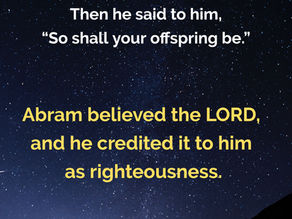Leviticus 1:1-5 - Kippur
- Chad Werkhoven
- May 5, 2025
- 5 min read
Your sins are atoned because blood without defect was spilled.
Leviticus 1:1-5 (NIV)
1 The LORD called to Moses and spoke to him from the tent of meeting. He said, 2 “Speak to the Israelites and say to them: ‘When anyone among you (ʾādām) brings an offering to the LORD, bring as your offering an animal from either the herd or the flock.
3 “ ‘If the offering is a burnt offering from the herd, you are to offer a male without defect. You must present it at the entrance to the tent of meeting so that it will be acceptable to the LORD. 4 You are to lay your hand on the head of the burnt offering, and it will be accepted on your behalf to make atonement (kippur) for you. 5 You are to slaughter the young bull before the LORD, and then Aaron’s sons the priests shall bring the blood and splash it against the sides of the altar at the entrance to the tent of meeting.
Canons of Dordt
Point 2 - Limited Atonement
Article 1: God’s Right to Condemn All People
Romans 5:12-14 - Mis-Markmanship
Deuteronomy 28:15-20 - Not A Tame Lion
Luke 15:11-16 - Prodigious Deprivation
Psalm 143 - Aggressive Prayer Pattern
Article 2: The Manifestation of God’s Love
Zephaniah 3:14-17 - The Mighty Warrior Who Saves
Lamentations 3:19-23 - Great Is Thy Faithfulness
Article 3: The Preaching of the Gospel
1 Timothy 2:1-7 - God Our Savior
Rom 10:14-17 - The Power of Preaching
1 Cor 1.23-24 - God's Foolishness
Psalm 93 - Mightier Than Chaos
Article 4: A Twofold Response to the Gospel
John 6:37-40 - Tensegral Theology
John 12:42-50 - Buffet Theology
Article 5: The Sources of Unbelief and of Faith
James 1:13-18 - The Devil (didn't) Make You Do It
Ecclesiastes 7:25-29 - Many Schemes
Ephesians 2:8 - The Gift of God
Psalm 95 - The LORD is OUR God
Article 6: God’s Eternal Decree
Ezekiel 36:24-27 - A Whole New Reality
Romans 9:15-21 - God's Mercy, Not Your Effort
2 Thessalonians 2:10-12 - Love The Truth
Article 7: Election
Ephesians 1:3-6 - Before the Foundation
Deuteronomy 7:1-10 - Set Apart
John 17:1-5 - Sovereign Submission
Psalm 115 - God Does What He Pleases
Article 8: A Single Decree of Election
Romans 4:1-8 - One and the Same
Romans 4:9-17 - Chicken or Egg?
Romans 4:18-25 - Faithfully Face the Facts
Hebrews 11:39-40 - Promises Kept
Psalm 33 - God's Control, Authority & Presence
Article 9: Election Not Based on Foreseen Faith
2 Timothy 1:7-10 - Passive & Powered
Deuteronomy 9:4-6 - You're Not That Awesome
Psalm 91 - The Shelter of the Most High
Article 10: Election Based on God’s Good Pleasure
Luke 2:13-14 - Christmas in March
Galatians 4:1-7 - From Slave to Son
1 Peter 2:9-10 - You're The Best Thing God Has!
Article 11: God’s election is unalterable.
Malachi 3:6-7 - Keep It Simple
Hebrews 6:13-20 - Unchanging Anchor
Hebrews 13:1-8 - Keep On Loving
Hebrews 6:13-20 - Unchangeable Blessing
Article 12: The Assurance of election
Hebrews 11:1-6 - Confident Assurance
Malachi 3:14-18 - Childlike Fear
2 Corinthians 7:8-11 - Godly Sorrow
Psalm 65 - The Hearer of Prayers
Article 13/14: The Fruit of our assurance
Isaiah 57:14-21 - God's Second Residence
2 Peter 1:3-10 - Make Every Effort
Isaiah 42:1-9 - The Sovereign & His Servant
Article 2: The Satisfaction Made by Christ
Since, however,
we ourselves cannot give this satisfaction
or deliver ourselves from God’s wrath,
God in boundless mercy has given us as a guarantee
his only begotten Son,
who was made to be sin and a curse for us,
in our place, on the cross,
in order that he might make satisfaction for us.
Summary
If you've ever tried to read the Bible from cover to cover, chances are it was here in the book of Leviticus that your plan went off the rails. Genesis and Exodus are full of narrative adventures that make the reading fun, but Leviticus trails off into seemingly endless lists of rules and regulations that seem irrelevant to New Testament Christianity. But these seemingly boring instructions contain the key to your salvation, so these words are worth the effort it takes to read them.
The opening line of the book contains a critical clue about your relationship to God: The LORD called to Moses... For all of its mind numbing details, the primary purpose of Leviticus is to communicate what's necessary for man to be at peace with God, and notice that it's the LORD who initiates the process! God doesn't wait for mankind (ʾādām) to come crawling back to Him, He called out to His people!
Although the book of Leviticus gives instructions for all sorts of different offerings and sacrifices, it begins with the most important. Without the kippur - the sacrifice of atonement which makes payment for sin - any other attempt for a sinner to come before the LORD is rendered moot.
The kippur procedure the LORD lays out contains two significant symbolic acts. First, the one bringing the sacrifice was to lay his hand on the head of the burnt offering. As one commentator puts it, "the sacrificer identifies himself with the sacrifice, which becomes a substitute for him, to die in his place." Second, the blood of the sacrificed animal was to be splashed against the sides of the altar. Blood represents life, and the kippur makes clear what the writer of Hebrews would note thousands of years later: without the shedding of blood there is no forgiveness (Hebrews 9:14).
Although all covenant people were welcome to - and required to - make a kippur sacrifice (Leviticus goes on to indicate a sliding scale of sacrificial animals so all income levels could participate), the specifications for the animal to be sacrificed was very specific: with was to be a male without defect... acceptable to the LORD.
Dig Deeper
The instructions given in the book of Leviticus guided the religious expression of God's people for centuries, but he book of Hebrews makes a shocking revelation about all of the rituals spelled out in Leviticus, stating that it is impossible for the blood of bulls and goats to take away sin (Hebrews 10:14). All that these kippur regulations were doing was painting a bloody picture of what was still needed to actually atone for people: It was man, not beast, who sinned therefore it would need to be the blood of a man without defect (physical & spiritual) that made the payment.
The rituals and sacrifices described in Leviticus are no longer binding on God's covenant people. It's not that God changed His mind and no longer requires sin to be atoned for, but that in Christ that atonement has been fully made. The lasting importance of Leviticus is what it pointed towards: the coming Messiah who would become the atoning sacrifice for our sins, and not only for ours but also for the sins of the whole world (1 John 2:2).
ACKNOWLEDGE WHO GOD IS: Our Father, who calls His people to salvation;
ALIGN YOUR LIFE WITH GOD'S WILL: Thank God that the blood of Jesus has fully atoned for your sin;
ASK GOD FOR WHAT YOU NEED:
Read the New Testament in a year! Today: Matthew 21




















Comments